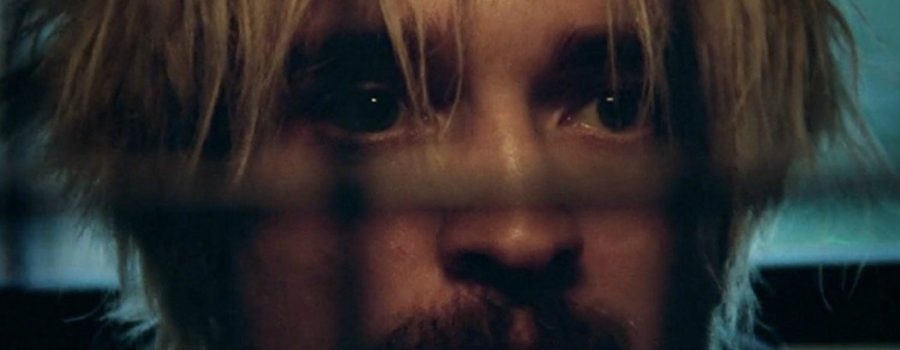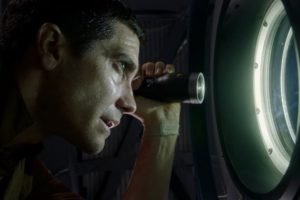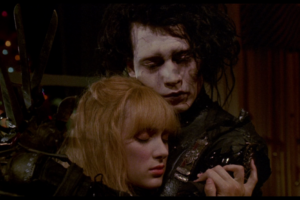[Published at Film Inquiry] If you’ve read the title of this review, you’re probably thinking, “hasn’t Robert Pattinson been around forever?” Indeed, Pattinson has been on the silver screen for about 13 years now. Then, of course, he became an international “heartthrob” in 2008 with Twilight, the beginning of a series that launched him into superstardom. So, yes, he’s been in the spotlight for a while.
However, in the years since the Twilight saga ended, he’s struggled to find rolls that have the depth to fit his skill as an actor; it’s hard to overcome the romantic leading character typecast. How does an actor become more than just a face? By disappearing into his or her roles. With brothers, Benny and Josh Safdie’s Good Time, Pattinson does just that.
He’s been on a quiet, upward trend, choosing substantive supporting roles and working with exceptional talent behind the camera; he starred in King of Venereal Horror, David Cronenberg’s Cosmopolis in 2012, which is the one of the first films that started to sway the more bitter and harsh critics towards “forgiving” him for the Twilight series.
After that, he starred in David Michôd’s The Rover, co-written by acclaimed actor and screenwriter, Joel Edgerton, followed by a supporting role in Cronenberg’s follow-up film, Maps To The Stars in 2014. He then appeared in a supporting role in legendary filmmaker, Werner Herzog’s Queen Of The Desert, and received acclaim for a supporting role in the James Dean biopic, Life in 2015.
However, it was his performance in Brady Corbet’s The Childhood Of A Leader last year, that started to win critics over. This year, Pattinson’s role as the buffoonish, drunkard cartographer in James Grey’s The Lost City Of Z furthered the actor’s exploration to discover the boundaries of his own acting limits; he’s not even close to reaching them.
In fact, With Good Time, it appears Pattinson may not even have any limits as an actor, range-wise. At 100 minutes in runtime, Good Time is a fast-paced, oscillation of raw emotion and manic suspense. A film that received an almost-unheard-of six-minute standing ovation at Cannes Film Festival this year, it’s one of the most unique crime yarns and oddly visceral character studies to come out in the past decade.
The Performance Of The Decade
Since every critic, now including me, has hyped up Pattinson’s performance in Good Time, even drawing parallels to a young, Taxi Driver-era Robert De Niro, let us address the rumors. The acting showcase by Pattinson exceeds the hype. His character, Connie’s problematic, nurturing and enabling relationship with his mentally disabled brother, Nick lies at the center of the film’s emotional resonance; the two Greek-American brothers are close, but as much as the self-absorbed Connie likes to think he bears the weight of responsibility for his brother, he holds him back from living any kind of normal life.
As a sociopathic, petty criminal on a no-holds-barred mission to bail his brother out of jail, Pattinson is unrecognizable. His physicality is as impactful as his wild-eyed facial expressions and unpredictable vocal inflections. He is physically emaciated and mentally psychotic. He’s as naturally reactionary and fervently interactional as a person you might encounter on the streets.

Pattinson doesn’t have any interest in adding an ounce of empathy for his character, Connie, which was written by Ronald Bronstein and Josh Safdie. He’s unlikable, maniacal, dangerously mentally ill, and tragically uninterested in anything outside of himself; even the quest to save his brother becomes secondary to his reckless journey filled with random encounters, selfishness, and an inexplicable thirst for blood and inflicting damage.
Much like the Duplass brothers’ earlier work, the Safdie brothers use quick zooms, extreme closeups, and jolting camera pans to enhance the anxiety that Pattinson’s Connie emanates. The extended, drawn-out closeups are particularly effective, showing Pattinson’s ability to turn from hysterically sobbing to cheekily laughing in the blink of an eye. I saw more emotion displayed onscreen in the first ten minutes of Good Time than I have in any of the films that I’ve seen combined this entire, monotonous Summer blockbuster season.
The Safdie Brothers Emerge, Another Gem From Sean Price Williams
In the span of two weeks now, cinematographer, Sean Price Williams has released two extraordinary works of cinematic anapestic cinema: Marjorie Prime and Good Time. Whereas Price Williams filtered Marjorie Prime’s dystopian world through an opaque, sometimes blurred lens, he takes a nearly opposite approach with Good Time, using vibrant primary colors, and a neon glow to capture the malign and erratic energy of the seedy New York after hour scene.
In that sense, and from a purely plot element perspective, Good Time almost parallels Martin Scorsese’s (who was listed under the “Special Thanks” section in the closing credits) underrated After Hours in its aesthetic and perpetually screwed, never-ending night narrative. However, the film’s themes and genres are drastically different; it’s After Hours’ evil twin.
Almost every scene contains either a neon reflection of predominantly red, green, blue, and yellow, or direct neon signage or lighting integrated in the context of the scene. It almost becomes exhausting by the end, but it’s indeed a colorful feast for the eyes, and that’s coming from somebody who just watched Suspiria (1977) on the big screen last week.
Benny Safdie does a phenomenal job behind the camera, but his performance is utterly exceptional, second only to that of Pattinson’s. Safdie’s character is sympathetic, but not overly-so. He doesn’t have much to say, but his disconsolate eyes speak volumes. It’s tragic to see him dragged into Connie’s toxic life as he struggles just to get by, day to day.

It’s not all sunshine and rainbows. Good Time is an excellent film oozing with applaudable aspects; it is, among other things, a sobering and pressing film about social inequality and police brutality. However, Ronald Bronstein and Josh Safdie’s script is a bit spasmodic, and not always in the way that it’s meant to be.
Yes, it’s interesting that the pacing of the film parallels that of Pattinson’s Connie’s thought process, but the secondary characters, however well-written and realistic they are, don’t get their due; it would have been nice to see more of Safdie, Jennifer Jason Leigh, Barkhad Abdi, and Maynard Nicholl, all who give committed performances, but whose characters don’t exactly fit into the narrative.
Good Time: A Meandering But Electrifying Odyssey Of Self-Destruction
There is an intense rhythm that Daniel Lopatin’s score provides, and it adds a much-needed consistency to plot holes, occasional narrative gaps, and jarring transitions. Good Time’s synth-heavy, keyboard pounding composition combine for a building, foreboding sound, and also provides a tackiness that accompanies Price Williams’ luminous cinematography quite well.
The aimlessness of the narrative is intentional, but not the average viewer will process it that way. Similarly to the format Joseph Conrad’s novel, Heart Of Darkness, as the imperialists hike further into the jungle, the element of unpredictability is enhanced by Conrad’s choppier, more claustrophobic sentence structure. As the time runs out to save his brother, Pattinsonbecomes frequently scatter-brained, just as his random encounters grow increasingly stranger within the context of the Good Time. He’s never in any other moment but the now, and, as such, an inattentive audience may miss the slightest hint at any sort of connectivity between these encounters.

Good Time is the film that will put the Safdie brothers on the international stage. At its core, Pattinson and Benny and Josh Safdie have an infectious creative energy in Good Time and an effect on the viewer through their seeming ability to work so congenially together. The entire cast and crew were on the same page, making an execution-dependent film like this work so well.
Though, one can’t help but ask the question, would Good Time be as well received without Pattinson’s casting? It’s difficult to say, because it’s hard to imagine anybody else in a role that plays directly to Pattinson’s continually emerging thespian strengths.
Did Pattinson’s performance have an emotional impact on you? Did you enjoy Good Time’s intense aloofness, or do you prefer a more structured narrative?
Good Time opened to a limited theatrical release on August 11, 2017, and receives wide release on August 25, 2017 in the US.








Leave a Reply
Your email is safe with us.